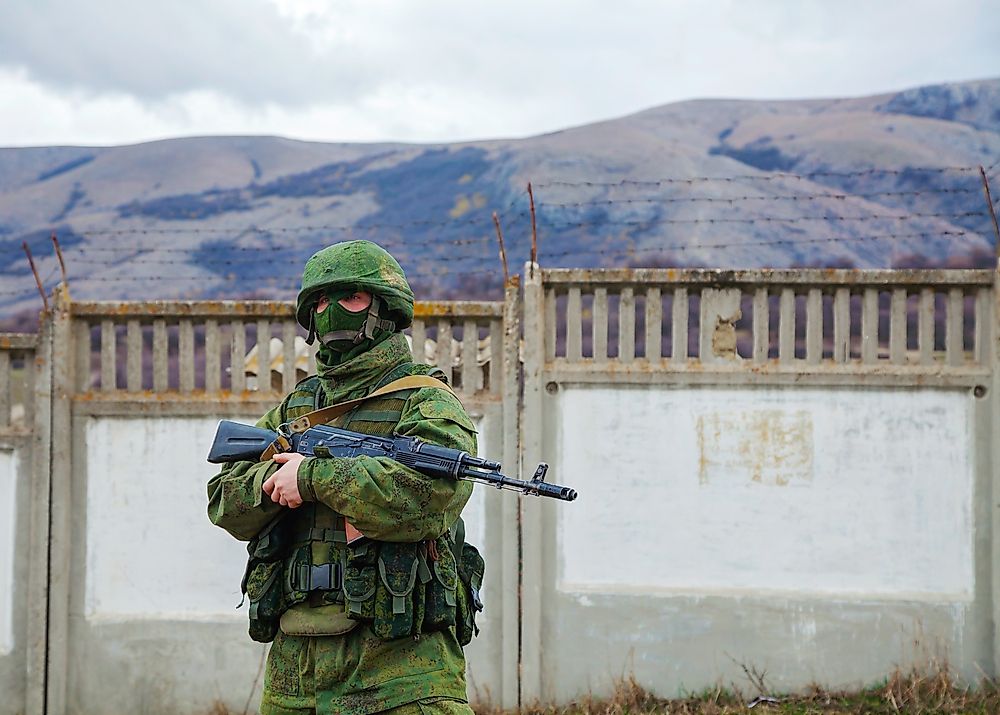Who Were the Little Green Men?

The Little Green Men were polite masked soldiers who wore unmarked green army uniforms and used Russian weapons during the Ukrainian Crisis of 2014. These soldiers occupied the parliament in Simferopol, Simferopol International Airport, and military bases in Crimea during Russian annexation of Crimea. The Little Green Men went by the names zelyonye chelovechki in Russian and zeleni cholovichki in Ukrainian, as well as by Polite People (vezhlivye lyudi) in Russia. The presence of these soldiers was controversial as Russia initially denied any knowledge but later gave scattered clues without directly acknowledging the men, however, they behaved well and did not interfere with people’s daily activities.
Weapons and Equipment
Immediately after videos and pictures of the men surfaced, the Finnish military magazine Suomen Sotilas (Soldier of Finland) analyzed the weapons and equipment and came up with the conclusion that only the Russian Federation issued such weapons globally. According to the magazine, the uniform included New EMR camouflage combat uniforms, New 6Sh112 tactical vest, and New 6B27, 6B7-1M composite helmet. To further prove that the men were special forces, they had several 6B26 composite helmets and 6Sh92-5 tactical vest, both used only by Russian paratroopers. Among the ranks and files, some of the men had Gorka-3 combat uniform and Smersh AK/VOG tactical vest that Russian special forces and mountain troops use. The Polite People also had New 7.62 mm PKP machine guns. Suomen Sotilas specifically mentioned the high probability that the troops were part of the “45th Guards Separate Reconnaissance Regiment of the VDV” whose military base is in Moscow’s Kubinka township. The most visible proof that they were Russian soldiers was from a picture of a single Russian special forces soldier in unmarked uniform carrying a VSS Vintorez (Special Sniper Rifle).
On August 26, 2014, a Reuters reporter who was in a settlement of Kolosky in Donetsk Oblast reported seeing dozens of armed strangers setting up roadblocks during the War in Donbass. These men were in uniform and had Russian accents. This second spotting led BBC to call the men “a Ghost Army” since they did not have an official identity. The following year on January 13, the Ukrainian news website censor.net confirmed the presence of Russian special forces together with eight “little men” patrolling the streets of Luhansk. Most of the men carried the exclusive Russian AS Val weapon.
Official Russian Explanation
At first, Russian President Vladimir Putin said that the men were not Russian soldiers but a local militia group that seized Russian weapons that the Ukrainian army had stolen. Shortly after, NATO issued a statement of finality saying the men were Russian troops. Pressed on how a militia group can have such a professional equipment and tactics, Putin stood his ground and further claimed that the militia acted spontaneously in self-defense and that they may have purchased the uniforms unlawfully from local militia shops (voyentorg), however, Putin found himself in an awkward position after it emerged that civilian Ukrainians can only carry hunting guns. Out of lies, on April 17, Putin agreed that there were Russian special forces in Crimea who had blocked Ukrainian Armed Forces during the events. According to Putin, the men were there to protect locals and help prepare a referendum. When Russian Minister of Defense Sergey Shoygu answered the same question, he made an statement about how searching for a cat in a dark room would be stupid, especially if the cat was not there to begin with, or was intelligent, brave, and polite. In April 2015, former Russian Admiral Igor Kasatonov confirmed that the Little Green Men were members of the Spetsnaz special forces and in December the same year, Putin finally agreed that there were Russian “people” in Ukraine but he continued to deny that they were special forces, or they were there for military purposes.











